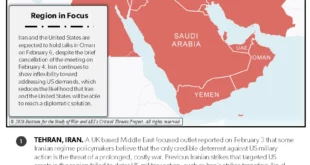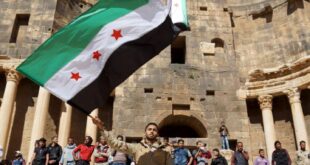 BEIRUT – Hezbollah leader Sayyed Hassan Nasrallah vowed on Friday to avenge the assassination of his senior commander Imad Moughniyah and threatened to deal Israel a crushing blow if it attacked Lebanon again.
BEIRUT – Hezbollah leader Sayyed Hassan Nasrallah vowed on Friday to avenge the assassination of his senior commander Imad Moughniyah and threatened to deal Israel a crushing blow if it attacked Lebanon again.
“I swear to you Haj Imad, your blood will not go to waste,” Nasrallah told a Hezbollah rally commemorating Moughniyah’s death in a car bombing in Damascus on February 12.
“We will defend ourselves the way we choose, at the time we choose, in the place we choose… With our will and bravery we will defend ourselves and our blood,” he said.
At time of his death, Moughniyah was the commander of Hezbollah’s powerful guerrilla army which fought a war with Israel in 2006.
But he had been on the United States’ most wanted list and hunted by Israel’s Mossad spy service for two decades for his role in a string of kidnappings, hijackings and attacks against Western and Israeli targets that killed hundreds in the 1980s and early 1990s.
Hezbollah and its main backer Iran have accused Israel of killing Moughniyah. Israel has rejected the charge.
Last week, Nasrallah threatened Israel with “open war” and Iran’s powerful Revolutionary Guards said Israel would soon be destroyed by the “hands of Hezbollah”.
Nasrallah said Moughniyah’s killing was a “pre-emptive move” by Israel for a future conflict with Hezbollah and vowed that any Israeli attack on Lebanon to weaken the group would be crushed and all of Israel would be hit with the group’s rockets.
“With all the pride, honor and confidence … we are ready for a confrontation and we are ready to defend and ready to create a new victory for us, God willing,” he told tens of thousands of Shi’ite Muslim followers who poured into Beirut’s southern suburbs, Hezbollah’s bastion.
“No one, neither the Zionists, or their agents will be able to protect all the internal fronts. No one will be able to protect their internal fronts from our rockets,” the black-turbaned leader said via videolink.
“NOT HIDING IN CAVES”
As a wanted man, Moughniyah traveled secretly between Lebanon, Syria and Tehran. Nasrallah said the fact that Moughniyah had survived this long showed the capability of Hezbollah’s sophisticated security services.
“After 25 years, they reached him. They consider their achievement that they killed Haj Imad and we consider it a victory that Haj Imad stayed for 25 years fighting them.
“He did not hide in a cave, he was always present on the frontlines,” Nasrallah said.
He said Moughniyah led the operation to seize three Israeli soldiers and an Israeli businessman in 2000. The soldiers were killed during the capture but their bodies and the businessman were exchanged for dozens of Lebanese prisoners and hundreds of Palestinian prisoners in 2004.
Lebanon and Hezbollah fought a 34-day war in 2006, after the guerrilla group captured two Israeli soldiers and killed eight in a cross-border raid. Around 1,200 people in Lebanon, mostly civilians, and 159 Israelis, mostly soldiers, died in that war.
A recent Israeli inquiry on the army’s conduct during the war found “serious failings” by political and army leaders during the war.
“If they think of entering the south, to any valley, any hill, I swear you (Israelis) will carry your tanks and soldiers and your entire army will collapse under the feet of Imad Moughinyah,” Nasrallah said.
Moughniyah was implicated in the 1983 bombings of the U.S. embassy and U.S. Marine and French peacekeeping barracks in Beirut, which killed over 350 people, as well as the kidnapping of Westerners in Lebanon in the 1980s.
Israel accuses Moughniyah of planning the 1994 bombing of a Jewish centre in Buenos Aires that killed 85 people and of involvement in a 1992 bombing of the Israeli embassy in the Argentine capital that killed 28.
The United States indicted him for his role in planning and participating in the 1985 hijacking of a U.S. TWA airliner and the killing of an American passenger. Washington welcomed Moughniyah’s death.
 Eurasia Press & News
Eurasia Press & News



